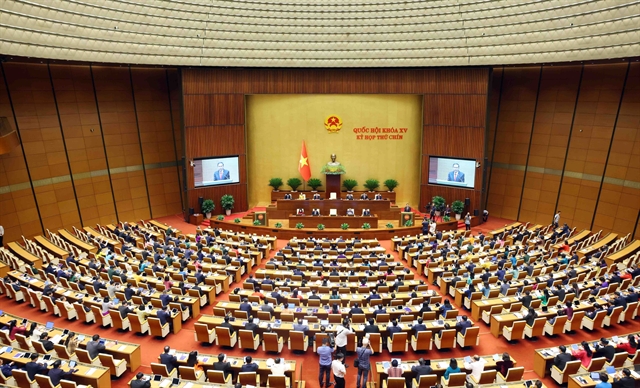 Politics & Law
Politics & Law

 |
| Prime Minister Phạm Minh Chính delivers his speech at the opening session of the 9th session of the 15th National Assembly on Monday morning in Hà Nội.—VNA/VNS Photo |
HÀ NỘI — Việt Nam is targeting a GDP growth rate of 8 per cent or higher in 2025, with the national economy projected to exceed US$500 billion in size, potentially achieving a ranking of 30th globally, two places higher than in previous years.
The country also aims to lift GDP per capita above $5,000 this year.
The targets were outlined in the supplementary report on the implementation of the 2024 socio-economic development plan and the early 2025 outlook, presented by Prime Minister Phạm Minh Chính during the opening session of the 9th session of the 15th National Assembly (NA) on Monday morning in Hà Nội.
Chính said Việt Nam’s GDP growth in the first quarter of this year is estimated at 6.93 per cent, the highest for the 2020-25 period, with several localities achieving double-digit growth.
Macroeconomic stability was largely maintained over the first four months of this year, with inflation kept in check and major economic balances secured.
State budget revenue exceeded VNĐ944 trillion ($36.3 billion), meeting 48 per cent of the annual estimate and marking a 26.3 per cent year-on-year increase.
The total import-export turnover is expected to surpass $275 billion, up 15 per cent.
By the end of 2025, the Government aims to complete over 3,000km of expressways and more than 1,000km of coastal roads. Work is being accelerated on the North–South Expressway projects (2021–25 phase) and key East–West transport corridors.
Healthcare investments will continue, with a shift from treatment to preventive care and overall public health management.
“The goal is to eventually offer universal free hospital care,” he said.
The nationwide roll-out of electronic health records and e-medical books is scheduled for completion before September this year.
Major hospital expansions, including the second campuses of Bạch Mai and Việt Đức hospitals, are expected to become operational within the year.
The Government is also formulating policies to adapt to population ageing, while capitalising on the demographic dividend.
Human resource development is a key priority, particularly in fields such as AI, data science, semiconductors, high-speed railway construction and nuclear energy.
Preferential student loan policies will be introduced for disciplines in technology, engineering, basic sciences, culture and the arts, with subsidised interest rates and loan limits aligned to tuition and living expenses.
The Government will allocate resources to waive tuition fees for pre-school and general education students starting in the 2025–26 academic year and to provide boarding facilities for ethnic students.
Efforts will also be made to ensure the smooth conduct of the 2025 high school graduation and university entrance exams.
By the end of this year, the Government plans to eliminate all makeshift and dilapidated housing nationwide and complete construction of over 100,000 social housing units.
A National Social Housing Fund will be established to support the development of affordable housing in major cities, particularly for young people.
Stronger-than-expected results
 |
| The opening session of the 9th session of the 15th National Assembly on Monday morning in Hà Nội. — VNA/VNS Photo |
Reflecting on 2024, Chính reported that Việt Nam achieved, or surpassed, all 15 key development targets, including 12 that exceeded initial expectations.
Labour productivity growth, previously below expectations for three consecutive years, also improved in 2024.
Việt Nam’s economy rebounded strongly in 2024, with GDP growth reaching 7.09 per cent, the highest in the region and among the top performers globally.
The national economic scale rose to $476.3 billion, advancing three positions to 32nd worldwide. GDP per capita hit $4,700, approaching the threshold of upper-middle-income status.
The country’s three strategic breakthroughs, regarding institutions, infrastructure and human capital saw decisive and coordinated implementation.
Social security, public safety and national unity were safeguarded under the principle of "leaving no one behind", he added.
“In a year marked by considerable challenges, the achievements of 2024 are highly commendable and represent significant progress over 2023,” he said, noting widespread domestic and international recognition of Việt Nam’s stability and reform momentum.
Despite the progress, Chính also pointed out shortcomings such as business operations remain difficult, particularly for domestic enterprises, public investment disbursement lags, consumer demand recovery is slow and exports are still heavily reliant on foreign direct investment, while the real estate sector continues to face risks.
Administrative procedures remain cumbersome, impeding both businesses and citizens.
Some civil servants have under-performed or shown reluctance to take responsibility.
To address the issues, he urged ministries and local departments to implement policies effectively and synchronously.
He stressed the need for agile, timely responses to international and domestic developments, particularly US tariff shifts, while maintaining macroeconomic stability, inflation control and the economy’s fundamental balances.
In his assessment report, the Chairman of the NA’s Economic and Financial Committee, Phan Văn Mãi urged the Government to act decisively and flexibly on key tasks.
First, global economic trends and policies from major economies must be closely monitored and analysed. Domestic resilience must be strengthened to withstand external uncertainties.
Second, traditional growth drivers such as investment, consumption and exports must be revitalised, while also fostering new engines of digital transformation, innovation, the green and digital economy. Public investment disbursement must be accelerated with at least 95 per cent of planned capital allocated.
Specific responsibilities should be assigned to each ministry and locality, with strict supervision. National target programmes and priority projects must be carried out efficiently.
Third, monetary policy should be proactive and flexible and supported by well-targeted fiscal expansion.
Measures are needed to reduce capital costs, enhance access to credit for businesses and encourage banks to cut lending rates. A healthy financial market and diversified capital mobilisation channels must be developed, with attention paid to corporate bond risks due at year-end.
Next, proactive measures must be taken to address trade conflicts and tariff changes.
Support policies should be rolled out for businesses, especially small and medium-sized enterprises, affected by such disruptions.
The domestic market should be strengthened and exports diversified, fully leveraging next-generation free trade agreements.
A landmark session
NA Secretary-General Lê Quang Tùng said the 9th session of the 15th NA is of historic significance, aimed at overhauling institutions, streamlining the administrative apparatus and expanding governance space for sustainable growth.
NA Chairman Trần Thanh Mẫn said: “One of the session’s core tasks is to amend the 2013 Constitution.”
A drafting committee will be established to revise the constitution, with innovative methods and broad public consultation to ensure democratic legitimacy.
The proposed amendments are expected to be submitted and passed by June 30, 2025 and take effect on July 1, 2025.
In total, 54 legislative projects are under consideration during the session, including 34 draft laws, 14 draft resolutions and six bills for consultation.
These span key areas such as Government organisation, national defence and security, justice, finance and budgeting, education, science and technology, innovation and digital transformation.
On economic and budgetary matters, the NA will discuss and decide on several strategic issues affecting national development, defence, security and global integration.
A resolution on merging provincial-level administrative units is expected to be passed, along with the formation of the National Election Council, shortening of the 15th National Assembly’s term and setting the election date for the 16th NA and People’s Councils (2026–31).
“The 9th session marks a pivotal moment for institutional reform, paving the way for Việt Nam to enter a new era of modernisation, digitalisation, environmental sustainability and inclusive development,” Mẫn said.— VNS




